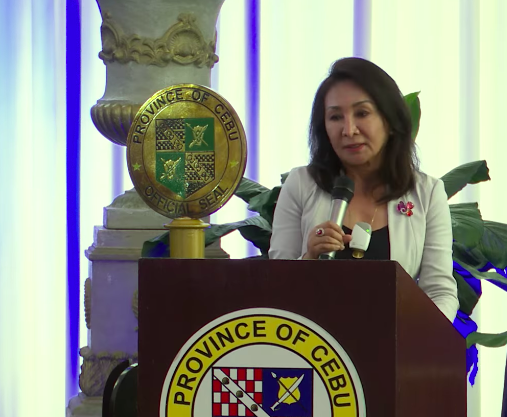
Cebu Gov. Gwendolyn Garcia speaking before members of the IATF during the Provincial Board’s Special Session on June 29, 2021 | Photo from Sugbo News
CEBU CITY, Philippines – A column linking Cebu’s swab-upon-arrival policy and the Delta variant, written by a member of the national government’s anti-COVID task force, did not sit well with local officials here.
Cebu Gov. Gwendolyn Garcia did not mince words when she gave her comments on Dr. Edsel Salvaña’s recent statements in his column Clinical Matters that was published in Manila Bulletin on August 10.
Garcia, in turn, challenged Salvaña to present his data to back his statements that pointed Cebu, particularly its ‘lenient swabbing protocols for returning overseas Filipinos’, as the source for the transmission of Delta variant in Mindanao.
She also said she will be lodging a formal protest addressed to Health Sec. Francisco Duque III, and that the Provincial Board will be passing a resolution to call out Salvaña on what she described as ‘irresponsible and totally biased declaration not supported by data.’
“How dare you blame Cebu. You better back up your statement with your data because we have our own data to refute you. Next time, Dr. Salvaña, be mindful of your statement,” said Garcia in a press conference on Wednesday, August 11.
Dr. Mary Jean Loreche, the chief pathologist of the Department of Health in Central Visayas (DOH-7) and consultant of the province’s Health Affairs, also disagreed with Salvaña’s opinion.
According to Loreche, the first cases of Delta variant in the country, reported last May 11, came from two returning overseas Filipinos who did not land in Cebu.
At that time, said Loreche, swab protocols at the Mactan-Cebu International Airport (MCIA) mandated that arriving Filipino passengers from abroad must undergo RT-PCR tests twice – upon their arrival, and one on the seventh day in compliance with the IATF guidelines.
“Samples that were PCR positive and that passed the criteria set by the Philippine Genomic Center for those tested upon arrival and days 5 or 7 showed negative for the Delta variant. It was only from the 123 samples collected from the community covering the periods of July 4 to 10, 2021 that the Delta variant was confirmed. Based on contact tracing data, all those positive for delta had no history of travel nor contacts with an OFW/ ROF who is confirmed for the said variant,” she added.
In his recent Clinical Matters column titled ‘Why we need this lockdown?’, Salvaña recalled when the Inter-Agency Task Force for the Management of Emerging Infectious Disease (IATF) was tasked to probe Cebu’s swab-upon-arrival policy, a derivation of the swabbing protocols the task force has come up with.
Salvaña, a member of the IATF’s Technical Advisory Group (TAG), said that they warned local officials here, during a special session last June 29, 2021, of the threats of Delta variant that would potentially lead to drastic consequences, such as having an overwhelmed healthcare system.
He added that several cases of the highly transmissible mutation of SARS-CoV-2 reported in Mindanao were traced to Cebu.
“We warned that if Delta got into Cebu due to lax border control, a bad surge was forthcoming. Delta is now in Cebu causing a large spike in cases, overwhelming their healthcare system,” said Salvaña.
“Some of the Delta outbreaks in Mindanao have been linked through whole genome analysis to returning Filipinos who entered through the Cebu airport. While it might have been impossible to completely stop Delta from coming in, it could have been further slowed down,” he explained.
For Loreche, however, the presence of the Delta variant here is not the only reason behind the surge of COVID -19 infections in the entire Cebu.
“The most recent surge in the Covid cases in Cebu may be multi-factorial in nature: human behaviors that are likely due to covid fatigue while for those who were vaccinated – that false sense of complacency that they have the full protection from contracting the virus,” said Loreche.
“Moving forward, Cebu has strengthened its PDITR (Prevent-Detect-Isolate-Treat-Reintegrate) protocols and is working closely with the private sectors and DOH-7 in manpower recruitment and incentivizing the healthcare workers assigned to COVID units,” she added.
Cebu, as an island, is experiencing what experts from Manila described as ‘one of its worst surges of COVID-19 cases.’
Hospitals, particularly in the capital Cebu City, are overwhelmed with patients.
The city government has also recently asked the help of the Roman Catholic church in looking for more spaces to place tombs as they record more COVID-related mortalities.
RELATED STORIES
Cebu province beefs up facilities, equipment for COVID patients
11 localities in Cebu province back to MECQ
/rcg

